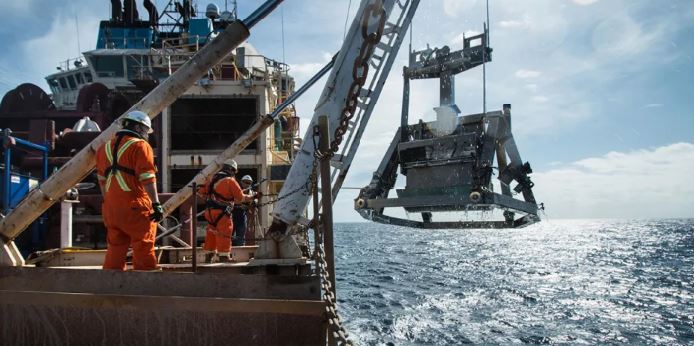Review: Plunging into the unknown
Saturday 11 November 2023 | Written by Supplied | Published in Editorials, Opinion

A scene from the documentary Deep Rising. COURTESY OF SUNDANCE INSTITUTE/23111075
Deep Rising is a documentary film directed by Matthew Rytz, narrated by Jason Momoa who is also the executive producer. It runs for 93 minutes. It was released in October 2023 and was premiered in Rarotonga on Tuesday, November 7 with further screenings on November 8 and 16.
Deep Rising explores the industrialised view of resource exploitation where international organisations such as the International Seabed Authority and corporations, organise research and exploration with the intent to begin mining and extraction of precious metals from the deep sea floor. These metals are necessary to power the electric battery that underpins the green economy.
The documentary shines a spotlight on the crucial relationship that the deep ocean has with sustaining life on Earth. The deep ocean is the last pristine environment that is untouched by human exploitation.
Deep sea mining has been under consideration for over 50 years. The documentary opens with a television clip from 1962 of U.S. President Kennedy talking about the resources of the ocean. We then move forward to the present as we follow Australian Gerard Barron, CEO of startup company DeepGreen/The Metals Company, on his journey to gather funding from investors, gain permission from the International Seabed Authority for exploration and win over public opinion to mine large tracts of the Pacific Ocean floor.
Barron’s pitch is metal nodules will be lifted from the ocean floor and when that process is exhausted, they will stop. Taking precious metals from the ocean is part of transition away from land mining. In order to power electric transport for the benefit of humankind, we need to source the materials from another environment hence justification of seabed mining.
Patania II is a 35-tonne subsea vehicle that can operate at a depth of 4.5 kilometres and in 2020 successfully collected manganese modules. The launching of the vessel off the side of a ship and into the depths, with the operators exuberantly punching the air, is reminiscent of early spaceship exploration into the unknown. Man and machinery working towards the progress of humanity through the exploitation of our environment?
Edited around these images of human exploitation are amazing underwater visuals of unique marine life. Spectacularly coloured jellyfish and translucent organisms of great beauty and weirdness that float across the screen. Sperm whales swim through frame looking for food, “It’s a hungry place”, states the narrator. Underwater volcanic black stacks rise hundreds of metres from vents along an ocean floor that looks austere but in the surrounding hot cloudy plume the environment is intensely colonised by bacteria and animals. These black stacks are also under threat from the miners. Along with the prized nodules on the ocean floor, nodules that have been millions of years in the making. We are at risk of destroying these deep sea environments that we know very little about.
The situation is presented as one of David versus Goliath. Environmental and conservation groups on the one side which are mostly sparsely funded, questioning the decisions and actions of industrialist groups, their adversaries. These companies who have money and therefore power to sway governments to agree to their destructive plans. Alongside shifting public opinion pushing us towards clean energy, oil conglomerates need to reinvest away from dirty energy and into deep sea mining.
The documentary implores us to understand what hangs in the balance. These nodules and stacks could deliver the precious rare earths, a vital component in the new battery led green revolution but at what cost? Is sacrificing this vast and little understood deep sea environment really worth it or are there alternatives in other technologies like hydrogen?
Deep rising shows us what is at stake. The expectation is we have to think hard and act fast about what is important now and for the future of life on planet Earth. We are all responsible for the state of our planet.
- Jacki Crummer Brown












































